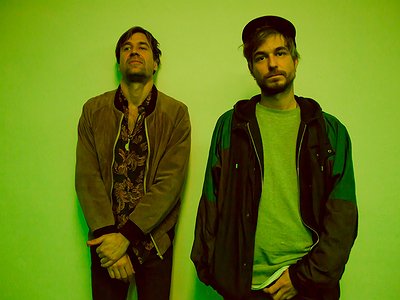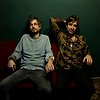Part 2
Could you describe your creative process on the basis of a piece or album that's particularly dear to you, please? Where did the ideas come from, how were they transformed in your mind, what did you start with and how do you refine these beginnings into the finished work of art?
AKKAN partnership is born from a non-premeditated totally spontaneous work and therefore there’s not a common creative process. Every track on this album has its own story and that’s what we love.
A good example is the first single that we released, ‘Bananat’: we composed that song in a summer afternoon taking a few beers on a terrace, we set up an outdoor pseudo-studio with synths, percussion and all the stuff... and the first synth line we recorded is actually the one that was left on the track, no changes, no corrections, no nothing, just the first take as it was.
Another one, ‘Vola, Topi’ was born out of some percussion grooves that we recorded in the streets at Essaouira. They had a lot of feeling and so we decided to extract the groove pattern via Ableton’s Audio to Midi tool and then to add a flute with the same extracted groove with a note randomizer and some scale adjustments. When we had this initial leit motif, we just duplicated the layer and passed it through the Eventide Harmonizer, so we ended up with two parallel flute melodies floating together in the same song. We decided to keep it simple and so we just added some drums and percussion with the TR-8S and this is it.
There are many descriptions of the ideal state of mind for being creative. What is it like for you? What supports this ideal state of mind and what are distractions? Are there strategies to enter into this state more easily?
M: I try to achieve a state of mind called flow. Where I get absolutely absorbed by the music and work without thinking. I use to like the result of those sessions. In that state I don’t judge anything, just play. To get in there first of all I make sure I have some hours ahead then start sequencing.
G: There is a typical Picasso quote in which we totally believe: “inspiration exists, but it has to find you working”. As Marc said, we don’t think there’s an ideal state of mind for being creative. In both cases, we’ve been making songs for the last 15 years and we have certainly found ourselves in hundreds of different personal situations and states of mind. Sometimes we will have made better songs and other times they will be rubbish. Perhaps the only factor that can have an influence, apart from the music flow, is the confidence you feel with yourself when facing a blank canvas, which is often the most complicated part of the creative process. But beyond this self-confidence aspect, we do not see a direct relationship between ‘being happy’ and ‘making joyful songs’ or vice versa, ‘being sad’ for making ‘melancholic songs’.
How is playing live and writing music in the studio connected? What do you achieve and draw from each experience personally? How do you see the relationship between improvisation and composition in this regard?
As we said before, this is a project based not just on improvisation but also on live performance, which means we give great importance to the conversion of our music into the live show. When we are in the studio making new tracks, we always have in mind the aim of translating all these layers and stems into the live setup. We understand that this music not only will be heard on Spotify, iTunes or whatever, but also enjoyed and danced in a live performance and so this is just a way of facilitating our work and making it more consistent.
How do you see the relationship between the 'sound' aspects of music and the 'composition' aspects? How do you work with sound and timbre to meet certain production ideas and in which way can certain sounds already take on compositional qualities?
G: I’d say my main focus is composition and Marc’s focus is more about sounds... and we work fine in this bi-disciplinary task distribution. It doesn’t mean I don’t care about sounds but I’m more into melodies and chord progressions and maybe Marc gets more fun by looking for the right sounds and effects. Then, depending on the starting element of each track, the sound itself leads you to a melody and vice versa. As we said before, living on the border between folklore and electronica opens a wide range of workflows, they’re all valid.
Our sense of hearing shares intriguing connections to other senses. From your experience, what are some of the most inspiring overlaps between different senses - and what do they tell us about the way our senses work? What happens to sound at its outermost borders?
M: I am a visual person. When I make music I always have an image in mind. That is exactly why I love effect units the most. Twitching knobs is my way to focus that image, that feeling. When I don’t feel like playing I usually read or watch movies to motivate myself. This is my way of feeding my subconscious mind with tasty stuff.
G: We actually give a lot of relevance to the visual aspect in our live shows... and we were thinking about incorporating some kind of interaction with the sense of smell, but this is next level, we’re figuring out how to do it. The aim here is to offer a multisensorial experience, this is not just about music.
Art can be a purpose in its own right, but it can also directly feed back into everyday life, take on a social and political role and lead to more engagement. Can you describe your approach to art and being an artist?
M: There is a balance within your life and your art. During your life, you need to make decisions concerning that balance. I lost many jobs because of music. And I didn't mind at all. As long as you have your priorities clear, it’s all good. If I don't use my creativity I get frustrated.
There is a very important mantra I repeat to maintain a healthy mind: your quality as an artist does not define your quality as a human being. We all have an intrinsic value, so if you fail at composing it doesn't mean that you fail as a human. That is my way to face my adversities in an artistic life. Because failure is a basic in any creative process.
G: Not with Akkan, but with beGun I’ve always tried to dress the musical speech in a social or a political envelope. Not from a revolutionary perspective because I don't have such a big speaker and it would sound pretentious, but from a didactic approach. I understand music is not just a means for emotion but also an agent of social transformation.
It is remarkable, in a way, that we have arrived in the 21st century with the basic concept of music still intact. Do you have a vision of music, an idea of what music could be beyond its current form?
We think that the interpretation of that current form of music depends on each different person. For most people music is something in the background that is consumed and processed without thinking. That happens because music is everywhere. Giving a hug to any action of our everyday lives. And that is fine.
Now, due to the pandemic, we’re living in very difficult times, not just for the music business but for the whole cultural sphere. We’re forced to innovate... or just die. So, it’s time to explore a different way of consuming music, live performances and art in general.






